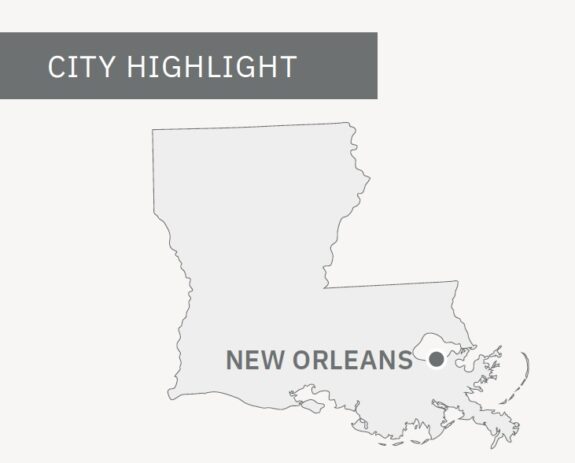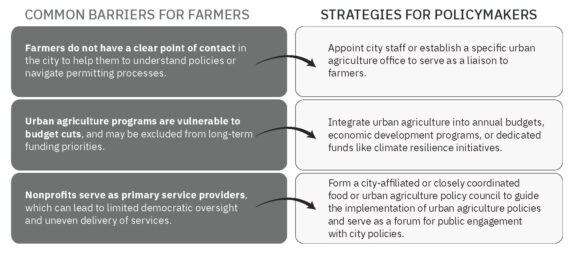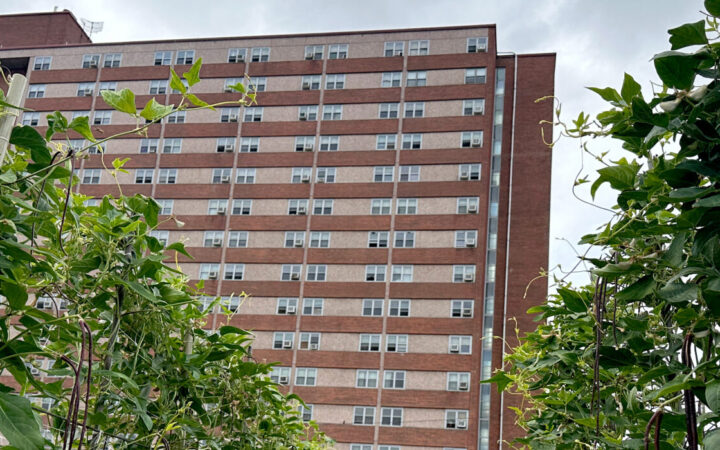This fact sheet distills the information in the City Governance and Public Funding section of “Urban Agriculture and Innovative Production: A Guide to Local Policy” into key takeaways for producers and policymakers.
Local Policy Barriers and Strategies for Urban Agriculture
A city government’s structure—how policy decisions are made, who makes them, and how municipal funds are raised and allocated—directly affects whether and how farmers can access land, water, funding, and other support. This structure is what we mean by governance. When urban farmers understand how governance works, they can be better equipped to navigate local government, access programs and funding, and lobby for updates to local policies. When city leaders recognize how governance impacts agriculture, they can make targeted changes—like creating staff positions or adjusting funding priorities—to more directly support urban farmers.
Who Does What in City Government (Relevant to Urban Agriculture)
CITY COUNCIL
Passes ordinances and approves budgets.
MAYOR
Issues executive orders, appoints department heads, and sets funding and policymaking priorities.
CITY MANAGER
In some cities, coordinates the day-to-day business of running the city government and implementing policies passed by city council.
PLANNING AND ZONING DEPARTMENT
Plans for and regulates land use and zoning.
PARKS AND RECREATION
Manages land and water use on city-owned parks lands.
WATER AND SEWER DEPARTMENT
Controls water permits, rates, and connections.
PUBLIC HEALTH DEPARTMENT
Regulates food safety and administers nutrition and food access programs.
ENVIRONMENT AND SUSTAINABILITY OFFICE
Implements city sustainability initiatives, including green infrastructure and climate resilience programs.
COUNTY GOVERNMENT
May coordinate with the city on some services, like parks and open space administration.
NONPROFITS
Fill in gaps in services, on their own or in partnership with the city, e.g. by coordinating community gardens or farmers markets.
New Orleans’s Urban Agriculture Liaison
 In October 2024, New Orleans established an Urban Agriculture Liaison role within the city’s Office of Resilience & Sustainability in response to the A Greener New Orleans campaign, led by a coalition of local farmers, gardeners, and nonprofit organizations. The Urban Agriculture Liaison serves as a point of contact for farmers, helps farmers navigate permitting processes and water access, convenes working group meetings, and meets with city officials to recommend policy improvements to support urban agriculture. Embedding this role in city government helps make farming visible and supported in the city by providing a direct bridge between farmers and city departments.
In October 2024, New Orleans established an Urban Agriculture Liaison role within the city’s Office of Resilience & Sustainability in response to the A Greener New Orleans campaign, led by a coalition of local farmers, gardeners, and nonprofit organizations. The Urban Agriculture Liaison serves as a point of contact for farmers, helps farmers navigate permitting processes and water access, convenes working group meetings, and meets with city officials to recommend policy improvements to support urban agriculture. Embedding this role in city government helps make farming visible and supported in the city by providing a direct bridge between farmers and city departments.
City Governance and Public Funding Barriers and Policy Strategies
Urban agriculture is often overlooked by local governments. By explicitly incorporating urban agriculture concerns into city governance, policymakers can help connect urban farmers and local government. City policies, staffing, and budget decisions can all shape whether urban farmers can access resources, land, and services. Below are common challenges urban farmers face while navigating city government, along with policy strategies cities can adopt to better support farmers.

Best Practices for Farmers to Engage with Local Government
▶ Find the right point of contact. Identify the city office, department, or staff member responsible for urban agriculture or food systems.
▶ Leverage nonprofit support. If your city lacks a dedicated urban agriculture office, connect with local nonprofits that support urban farmers through policy advocacy, technical assistance, or community organizing.
▶ Know your policy landscape. Look for relevant programs and policies not just at the city level, but also at the county and state level.
▶ Participate in local government. Attend public meetings, submit comments during policy reviews, and connect with like-minded neighbors to advocate for long-term city support for urban agriculture.
Suggested Citation
Ctr. for Agric. & Food Sys., City Governance and Public Funding: Local Policy Barriers and Strategies for Urban Agriculture (2025), https://cafs.vermontlaw.edu/resource-library/city-governance-and-public-funding.



